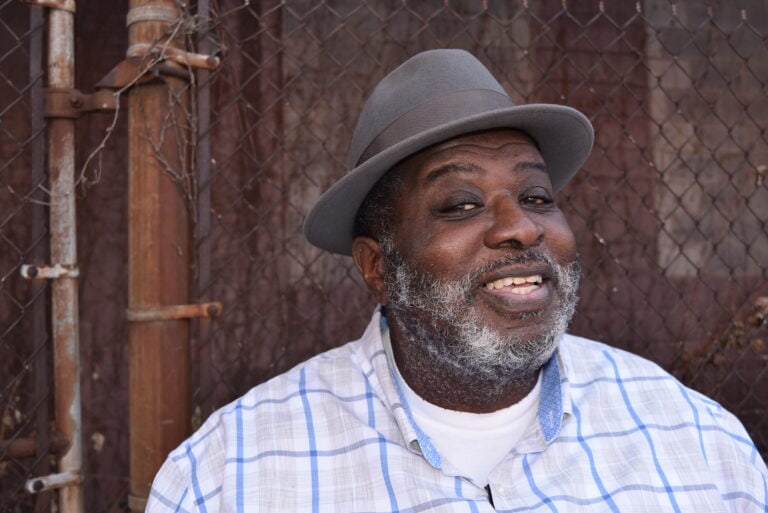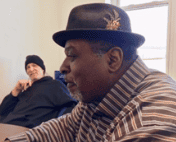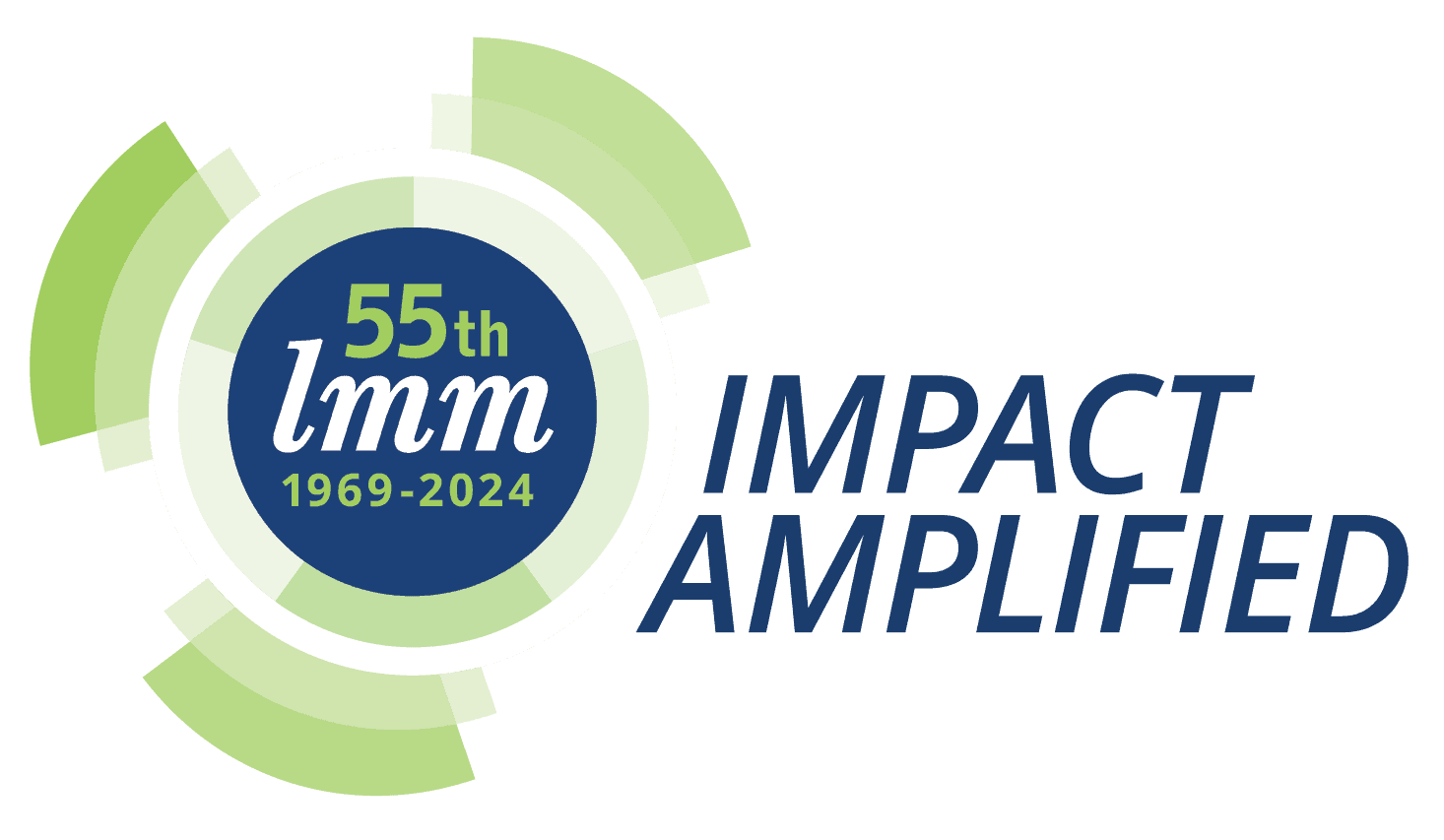Angelo Anderson

I was a child when the Hough riots happened and that was my neighborhood. I had a red wagon. I used to take groceries home for people in the neighborhood. During the riots I decided I’d take that wagon, go out and do like the big boys were doing. Looting was not a good idea. I couldn’t put a big TV in a wagon, and then somebody took my wagon. I never saw it again. It was a heck of a night.
There is something in Angelo’s early life that keeps surfacing. “Whenever I needed something, it seemed like it would just magically appear.” Angelo learned to keep step with it. There continues to be something at work in the texture of Angelo’s life that he carries on now.
Where it all began…
Angelo was in a predicament… addiction & homelessness. The thing he needed came into view again and again by way of other people…the landlord who gave him a break so he could get off of crack…Sister Corita of St. Augustine’s Hunger Center who took him up in her amazing orbit of love. There were the folks at Northeast Ohio Coalition for the Homeless (NEOCH) who believed in Angelo even when he did not. And there were the nuns at St. John’s Cathedral who curiously appeared on the scene at a moment of desperation. They are all a part of who Angelo is.
With a deep breath, Angelo begins.
I started advocating for people who are homeless, people impoverished, when I was one of the leaders on a walk from Cleveland to Columbus to protest the general assistance cuts implemented by Governor Voinovich in the late 80’s.
How did you get involved in that?
Interchurch Council, George Hrbek and Sister Corita at St. Augustine’s on West 14th asked me and I didn’t have enough sense to say no. Next thing I know, I was one of the leaders. I met George Hrbek some kind of way.
(George Hrbek, the Lutheran minister in Selma during the early civil rights era, a minister who once got into a fistfight with the president of the White Citizens Council, and who would pull his car over to confront groups of robed Klansmen. Then George came to Cleveland as LMM’s advocacy director, leveraging networks to support antiracist programs and policy changes.)
You were picking up this sense that we had some responsibility to deal with injustice.
Yes. When we got back to Cleveland a little while later, I helped start a newspaper, The Homeless Grapevine. I was still homeless, staying wherever I could – dope houses, public square, Metro Parks, doorways, RTA buses, wherever. I used that paper to help myself get off the street but it took a long time because I had an addiction to Crack. I had to overcome that addiction before I could successfully move off the street.
How the heck did you overcome Crack?
I stayed in a hotel way out on Detroit Avenue. Last bus coming back downtown left at 7:45pm. Each night I didn’t come back into downtown was another night clean. It took about a year and a half for me to feel comfortable staying back here in the city. That’s how I broke my addiction.
I’d get up every day and buy me some papers. I would limit my paper account to around 50. Sell enough to pay for the hotel room, get something to eat, and make sure I had enough left to buy papers for the next day.
Tell me a little about the roots of the Homeless Grapevine.
 There was a gentleman doing a thesis on homelessness from Kent State and he hung out with me and 3 other homeless guys for about 2 weeks. We had a one-page thing going on where we tried to top each other’s stories about life on the street. And we sold this one-page thing for a dollar. He told us about other cities that had a street newspaper, and he wanted to help us start one here in Cleveland. So, he approached NEOCH, and asked them if they’d be open to writing a grant to get money for the papers. That’s when Bryan Gillooly was the director. He got the grant, and the first issue came out with the understanding we’d have to sell all of them each time in order to make the next printing. Thirty years later, we’re still pretty good.
There was a gentleman doing a thesis on homelessness from Kent State and he hung out with me and 3 other homeless guys for about 2 weeks. We had a one-page thing going on where we tried to top each other’s stories about life on the street. And we sold this one-page thing for a dollar. He told us about other cities that had a street newspaper, and he wanted to help us start one here in Cleveland. So, he approached NEOCH, and asked them if they’d be open to writing a grant to get money for the papers. That’s when Bryan Gillooly was the director. He got the grant, and the first issue came out with the understanding we’d have to sell all of them each time in order to make the next printing. Thirty years later, we’re still pretty good.
What came next for you?
After the newspaper took off and I broke my addiction, I did the Homeless Stand Down for two years. Brian Davis at NEOCH asked me to be the coordinator.
(The Homeless Stand Down is an annual event for those experiencing homelessness; a day of respite from the elements, renewal of the human spirit, and connection to needed services. An estimated 1,500+ guests now attend, with social service providers, haircuts, medical screenings, meals, personal hygiene kits, bus passes and more.)
That first year I wanted to do haircuts. The next year I wanted to give out shoes because people walk everywhere. I got shoes donated through the Timberland Corporation. To this day, I don’t know how they found out about me. But I got a phone call, Chicago calling, Oprah Winfrey’s Angel Network. They had heard about what we were doing here in Cleveland, and asked if they could help. They asked me how many shoes I needed. I said 500 pairs and they gave me 1,000. All brand new for men and women. It was a big headache! I swore I would never give out shoes again. (Laughing again) Yet, every year I give out shoes the week of Thanksgiving through Soles for Souls because it’s a way to give shoes to people who really need them.
There at the beginning
Then the planners for 2100 finagled me into working with them as a voice for those who are homeless, like me. It was the year 2,000 when the agency opened its doors.
It seems people recognized you bring a lot to the table and supported you.
I think what I bring to the table is awareness of what it means to try to start your life over again once you’ve been homeless for a period of time. You have to overcome…paying bills on time, find a way to believe in yourself again. Have to learn to trust people, and you have to be willing to give back. For a long time, I wasn’t getting paid for a lot of the stuff I was doing. But it seemed like I never wanted for anything. Whenever I needed something, it seemed like it would just magically appear. The more I gave, the easier my life became.
I tell Angelo I’ve talked with people who worked with Sister Corita and they said the same thing. The more they gave, it seemed doors just opened. Like they were in the flow of something larger than themselves. Sister Corita Ambo headed up the Augustine Catholic Church Hunger Center for 45 years. At Thanksgiving they serve upwards of 20,000 individuals.
Shaking his head in agreement, Angelo continues… I’m a big advocate for volunteering because through that I changed my life, and I realized there are a lot of good people out here who are willing to help you, especially when you are trying to help yourself.
More responsibility…
Then I became the director here at 2100. I think we had a staff of 7 people then, open 24/7. I kept advocating for more beds. We had people in the hallway, dining room, on the garage floor. In the winter when it was time to leave at 7 am, we’d open that big garage door and the wind would bring the snow in.
How did you become director?
I would go to all the meetings. They wanted a grassroots perspective. I gave a lot of input on what I thought the shelter should provide and how it should provide it. I wanted to make sure those men who were working could get a separate space from those who were not. I wanted to make sure those who needed help with addiction had a program set up for that. We also made sure the Veterans had a dorm for themselves.
Who else was on in on the planning?
George Hrbek. And we had people from City Council. The Councilman at that time was Joe Cimperman. We also had the Council president, Jay Westbrook. Everybody had their input. We had the County and the County Commissioners who played a big part in getting the funding. They snuck us in over here on 21st Street and Lakeside because they were getting a lot of pushback from people saying “Not in my neighborhood” They didn’t want it. The County got this building, an old cheese factory, and we got it up and running with very little push back from the neighborhood. 22 years later, here we are.
What are some of the barriers you see for those who are homeless?
Some of the things that keep you from getting hired. The background checks go back too far and don’t allow a guy to show he’s changed. They just automatically assume it’s the same guy from 10-15 years ago. These backgrounds haunt the men in so many other ways, housing, insurance, on and on.
There are also higher rents without staying in line with pay. Mental health. I see more mental health issues today that I’ve ever seen. Addiction and alcoholism play a part too, but it’s those other factors that play a bigger role. You’ve got to first of all want something out of life. And you’ve got to believe that you’re worth something better. And hope…they lose all hope.
It seems like some people have lost their self-worth and it takes another person to be kind and see the worth of the person…
You see a difference when that happens. We see this in our listening program at 2100. Sometimes just the fact that they have somebody to talk to changes their attitude. Just the fact that someone says, “Hi, how you doing today?” can change an attitude, and you can’t dispute that.
Angelo Reflects
Can you tell me about someone who was that person for you?
Sure, Sister Corita. I don’t know what it was about her. She’s short and forceful (another laugh as Angelo thinks back.) I don’t know what she saw in me but she saw something. She would always allow me to sleep in the corner on the floor. I’d be half asleep and I could hear her in the background say, “No, just let him sleep, he’s okay.” And then she would wake me up later and ask me if I could help wash dishes and mop the floors or whatever. And of course, I would.
There were a couple of nuns down at St. John’s Cathedral who seemed to materialize out of thin air at some of my worst moments. I didn’t even realize this until I looked back.
I can’t say I picked myself up by myself
Letting out a deep sigh, Angelo speaks with gratitude of NEOCH. They never thought I couldn’t do something even when I thought I couldn’t do it. They always said, “You can do it, JUST DO IT, Angelo.” (Laughing)
Angelo is cutting up but I hear gravity in his voice for these people who intervened in such an essential and low-key way.
When somebody tells you that, what do you do? I just did it. I can’t say I picked myself up by myself. I can never say that.
Angelo goes further back… The manager who allowed me to stay at that hotel at a discounted rate. When he asked me why I was staying at the hotel every day, when I actually told him the truth, he gave me a price break, which was a big help because some days I might have had a dollar left but I was determined to break my addiction.
So, the hotel manager gave you the time and the place to stop using.
That, and the responsibility NEOCH gave me – I was responsible now for different projects and supervising college students, and AmeriCorps students. Now, not only do I have myself to worry about, but all these people looking up to me, assuming that I knew I was doing, (really laughing).
Paying it forward
Here at 2100, I helped with a work/employment program, and a GED program so they could find better jobs. When I was with NEOCH, I helped to establish a phone bank system where people living on the street had a phone number to give employers and landlords. They could call that number and leave a message so they had a way to be contacted. Even now, people don’t have phones. So, if they do an application for an apartment or social security, how are they contacted?
You were picking up on essential needs which others were missing.
Right. We advocated for the use of bus tickets through NEOCH. While they couldn’t give free bus tickets, the first couple years they gave discounted tickets, and that became a big, big win. Now here at 2100, we give a guy a ticket to go to mental health appointments, to go and look for an apartment, to get back and forth to work when you just get employed and don’t have a first paycheck yet.
Nowadays, I work with guys with mental health issues. Many of them are older with physical issues and a lot are dual-diagnosed. We work to get them stable and help to get them income through SSI, SSDI, and employment. We encourage them to get help for any addictions. Once they’re stable, we start working on housing. Our model has been successful and, in some ways, emulated by other programs.
During COVID I worked from home. I had a number where the men could reach me. I went to the hotels… helped those guys find housing so they wouldn’t have to come back to the congregate setting at the shelter.
Too Ornery to let anything stop me
Have you ever been challenged by racism?
Yeah, but the problem was I was too ornery to let it stop me. Great story: In my youth I was a swimmer. This one kid, he beat me twice in two meets. I was determined I wasn’t going to let him beat me again. The third time I beat him. Him and all his friends cheered me. I was the only black guy swimming. He said, “My dad’s name is Angelo. My dad said to bring you over for pizza if you beat me.” I’d never had pizza in my life because in our neighborhood we didn’t have pizzas.
The Dad told his son, “I don’t think he’ll beat you, but if he does, bring him over here to the pizza shop.” He was in Murray Hill where black was a No-No. (Laughing). But he took me over to his Dad’s pizza shop on Murray Hill Street, and introduced me to his dad. And his dad was laughing and said his son had told him about “this black kid by the name of Angelo and I didn’t believe him.” The dad asked me if I’d ever had pizza and I said, “Naw.” He said, “We’ll, you’re going to love it.”
A lot of time I’d be the only black person in situations, but I’m too ornery to be phased. I feel like, you know, the joke’s on you. That’s how I’ve been my whole life, I just see people, I just see people and I try to be respectful and I try to get the same respect.
Living on the street, doing this kind of work, you see good…but you also see evil. I believe in both because I have seen them, up front, right there at my face. I have seen the action of both ways. Sometimes I don’t feel like coming into work, but every time I get here… within an hour, I feel like I’m making a difference. Like I’m supposed to be here doing some good in somebody’s life.


